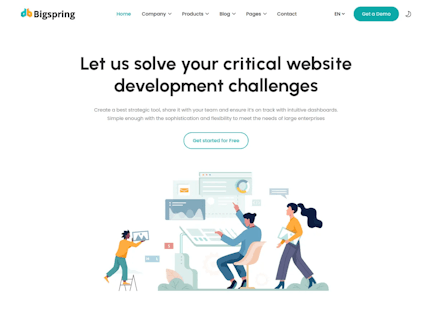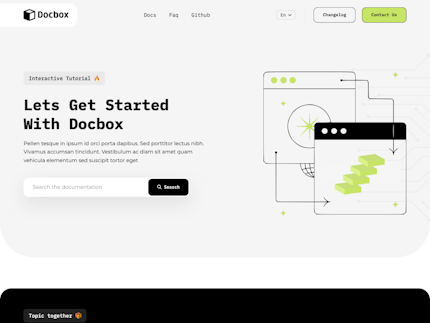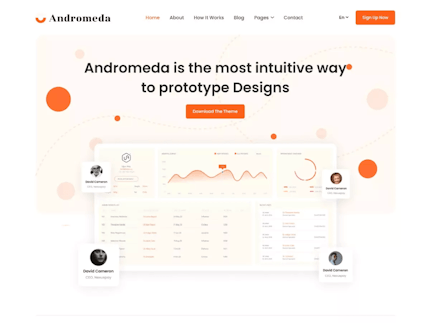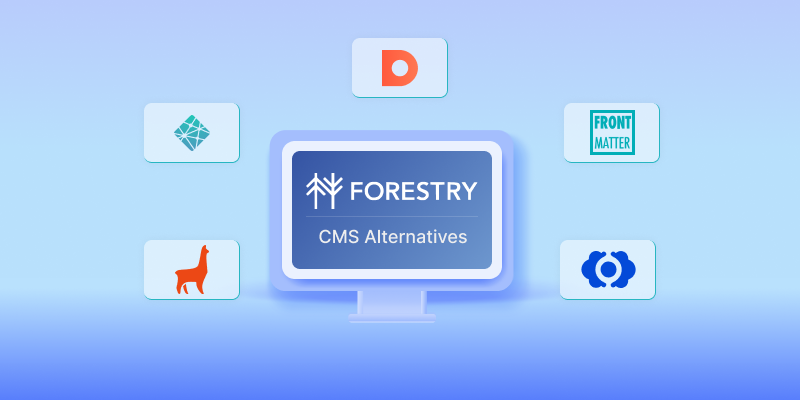
Are you trying to figure out which Headless Hugo CMS to manage your content? If that's the case, you've come to the right spot.
With a headless Content Management System, your website’s content management effort can be minimized significantly. This is because you can easily edit and manage your site's content visually without touching the codes. Moreover, you won't need any professional's help for changing or updating the contents of your website. Even hosting and managing the data in the cloud becomes easier with a CMS.
Currently, there are numerous content management systems available for Hugo out there. Therefore, picking on the best one for your needs may be tricky. We've compiled a list of 10 popular CMS platforms, along with their key features, benefits, lackings, and cost. So, for your next web project, you can stop wondering about which platform will work best for you and start working with one of the best CMS for Hugo instead.
If you are new to CMS, you can learn the fundamentals of CMS before proceeding further. But if you are already familiar with CMS, you can skip this section and directly move onto our list of the best CMS for Hugo.
Definition of CMS
A content management system (CMS) is an application that enables people to create, maintain, and modify website content without any specialized technical knowledge.
In simple terms, a content management system (CMS) is a technology that assists you in crafting your site without writing codes from the beginning or even without any knowledge of coding at all.
Rather than designing your personalized mechanism for crafting the web pages, saving images into the platform, and other features, CMS takes care of all the processes in one space. In the meantime, you can concentrate on other essential aspects of your website. Additionally, you can leverage the content management system for various purposes, such as
- Enabling multiple users to utilize the system simultaneously
- Managing all the documents on your site
- Maintain a content publishing cycle
- Structuring the contents of your site
So, what is headless CMS? Why is it called headless? Let’s look into it.
About Headless CMS
A headless content management system is the current alternative to the previous monolithic CMSs that regulated content management. This trending content management solution is named "headless" since it splits the content creation and storage section or is backed from the content representation layer or the front end (head), where content is organized for delivery. This is usually not achievable when using a standard CMS to develop a website.
While using a Headless CMS, the content and marketing team can craft and save content resources by leveraging flexible, reusable modules in a back-end repository to craft and save content material.
On the other hand, front-end designers and developers can concentrate on making the greatest possible presentation of that content. The contents may be delivered to a website, mobile app, or other online services.
Traditional content management systems are bound by coding and programming languages, but developers can control the content format delivered to the users in headless CMS.
With headless CMS, you can take the following actions:
- Create content
- Authorize users
- Maintain Content Repositories
- Advanced asset management
Now that you’ve learned about CMS and headless CMS, you should know how to select the best one for your Hugo project. For that reason, you need to set some major criteria and then match those criteria with the CMS you will choose.
Things To Consider While Choosing The Best CMS for Hugo
Currently, the Hugo platform has over 100k active sites and is strongly supported by the Jamstack community. It has an admirable reputation for massive speed, simplicity, and versatility. It claims to be the world's quickest static site generator that takes less than one millisecond to construct a web page.
Hugo's pre-built features such as menus, sitemaps, i18n support, shortcodes, and image optimization will assist you in running your website with ease. Also, the platform includes a vast amount of themes in its domain.
When looking for the finest CMS for the Hugo platform, you should have a list of criteria in mind. These criteria are not complex to understand, but it will become easier for you to select the best CMS for Hugo if you can sort out these key factors.
You may consider the following factors in choosing the ideal content management system:
Content Administration
Content administration or user accessibility comes first when thinking about an environment where everyone can collaborate. This is because a dedicated team of developers, content managers, and authors can maintain content in the best possible manner.
Site owners should be able to grant just editorial access to their preferred users, allowing them to update but not delete their content. Thus, you should consider a headless CMS that allows flexible user accessibility.
Multi-purpose Functionality
Think how much time and effort you can preserve for other tasks if you can maintain beyond contents. Select a Hugo CMS that can manage your websites' content and other elements or settings, such as Menu, Configuration, Image file type, etc.
Multilingual Support
Multilingual features are essential for expanding your website to a global audience. Therefore, choose a Hugo CMS that offers multilingual support.
Live Preview Support
Your headless CMS for Hugo should provide you a Live Preview of your website without launching it for public view. With a live preview, you will have a clear idea of whether you need to fix your content before publishing or not. You'll also be able to see how your content looks on various devices and determine if it's reader-friendly or not.
Archetype Page Template
The best Hugo CMS must offer arch-type page templates. With page templates, you will be able to display your preferred content elements on your selected web page.
With all these considerations in mind, you can now sort out the best CMS for you. All you need to do is sort out the specific features. Now we will walk you through our list of some of the best and most popular CMS for Hugo.
10 Best CMS For Hugo
Tina
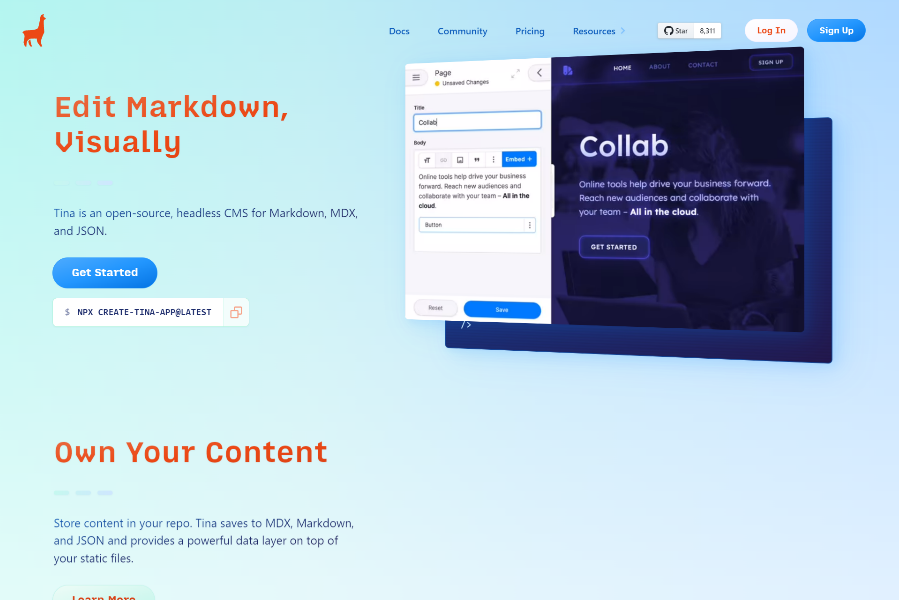
Tina is not just a CMS for Hugo; it's a website editing toolbox for Gatsby, and Next.js-based React framework. It is a gateway that sits between the front end and the content origin, which is generally markdown or yml files.
Tina aims to provide complete control over creating personalized editing experiences without depending on any platform. It includes certain tools and apps to improve cooperation among online content authors and developers. Moreover, this Git-backed CMS allows you to edit and view changes in the content in real-time. Currently, It's a complete open-source CMS that is free of cost.
Advantages
- Editors and developers can collaborate through a multi-user editing environment
- Comprehensive live-editing experience for content editors
- Various fields available for content and theme customization
- Predefined components are available to craft your site flexibly
Disadvantages
- It's an add-on or replacement for Git-based CMS that does not replace API driven CMS
- Provides better support for React-based tools (Next.js, Gatsby, etc)
If you need help migrating from Forestry to another CMS, Zeon Studio can assist you in having a smooth & hassle-free migration.
CloudCannon - All-In-One Hugo CMS
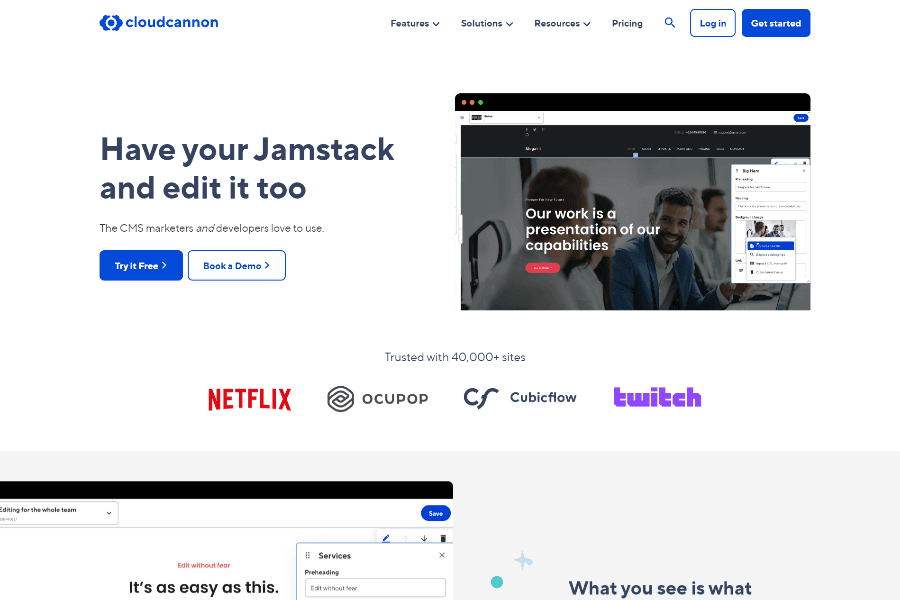
CloudCannon is the perfect content management system to maintain your jamstack-powered websites. This Git-based CMS empowers team collaboration and cuts down the site-building time.
While using this CMS, you will be getting complete access to your content, quick rollback, and setup processes. It also enables your content team to craft & edit pages using custom components without seeking the assistance of any developer. Moreover, you will get the upper hand In search engine rankings while using this content management system.
Advantages
- Flexible user interface with easy content editing and robust publishing procedures
- Includes everything to modify and host high-performing Hugo websites
- Developers can collaborate with other users to minimize the build time
- synchronizes your Hugo website with your Git repository
- Inline editing allows you to update content immediately on your website
- Allow the editors to create full pages by assembling your own prebuilt components
Disadvantages
- Pricing is primarily geared toward freelancers and agencies
- Not recommended for managing a large scale eCommerce sites
- Can’t properly manage image-heavy
Decap CMS - Best Content Management System For Hugo
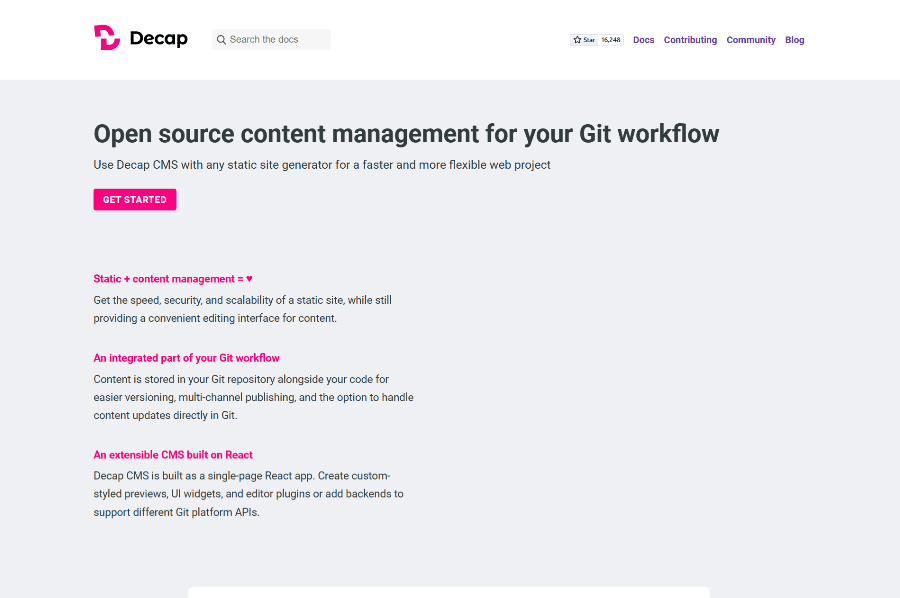
Decap brings together a whole ecosystem of current tools and services into a single, easy-to-use process for developing high-performing websites and apps. It's an open-source content management system that is ideal for maintaining your Git workflow. You can combine this CMS for Hugo with any static site generator for a faster, smoother, and more versatile web project.
Your contents are preserved in the Git repository alongside your code. As a result, you can maintain simplified versioning, multi-channel publication, and content updates directly through Git. You will be getting excellent performance, security, and scalability of your static site while maintaining a user-friendly content editing experience. There is no need to worry about pricing since Decap is a free and fully open-source CMS.
Advantages
- Offers a rapid web-based user interface with a rich text editor and real-time preview.
- Lots of customization options and adaptability
- Advanced authentication via GitHub, GitLab, BitBucket, or JSON
- Specify countless content formats via customer fields
- Media uploading feature via drag and drop option
- Flexible installation process
Disadvantages
- View content modification when the construction process is done.
- Have to rely on developers to create personalized previews, UI widgets, and editors plugins.
- Managing large-scale websites can be challenging.
Strapi - Powerful Headless CMS For Hugo
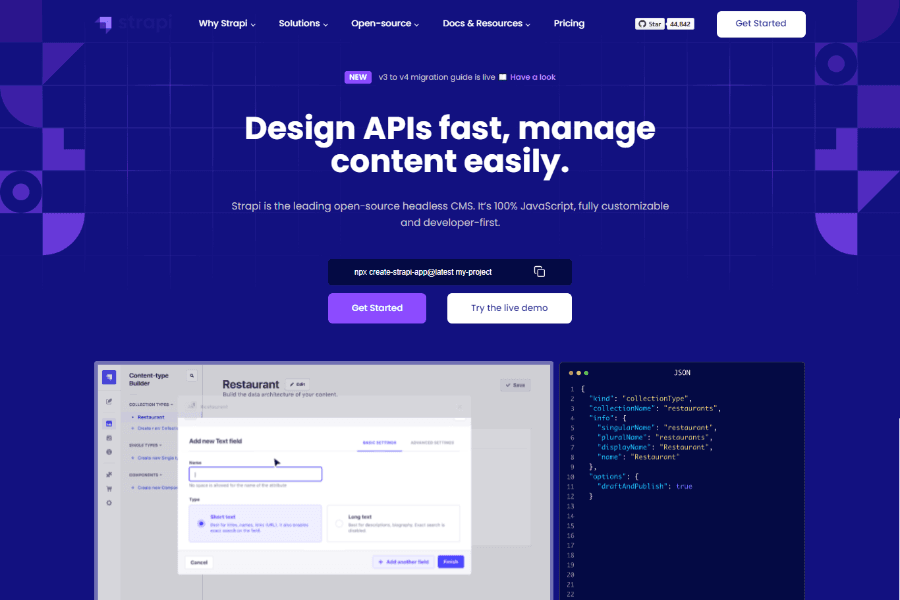
Strapi is an open-source Node.js and React-based headless CMS that enables you to use your preferred database. Currently, this content management system supports SQLite, MongoDB, MySQL, and Postgres. Creating and managing a simple site and a large-scale eCommerce application becomes easier while using this CMS.
In Strapi, developers and editors may all use the same admin panel. You will get a simple user interface that enables swift content production and management capabilities when it comes to the editor. Besides, you can quickly construct your API content model from a developer's viewpoint.
Advantages
- Use it in your code editor and customize the code to tailor API
- Make one-of-a-kind pages with a distinct content structure
- Integrations with Cloudinary, SendGrid, Algolia, and more
- You may use the editor to insert dynamic content blocks
- You can create personalized roles and permissions
- Organize content in a variety of languages via i18n support
Disadvantages
- Insufficient support while migrating or deploying data across different environments
- TypeScript support is limited and requires an external package
Sanity
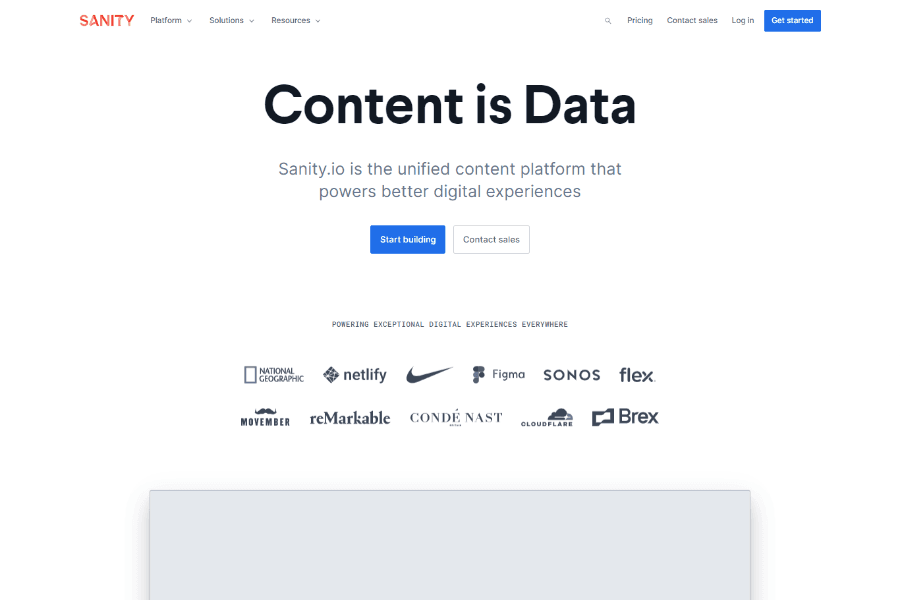
Sanity content management system’s adaptability sets it apart from other CMSs. This API’s significant separation from the UI opens up a world of customization options. It changes the traditional web experience with its adaptability.
Sanity offers real-time collaboration as well as a multi-user editing experience to empower the team members. Allow content producers, designers, and developers to collaborate while keeping content and presentation separate. This CMS has a lot to offer when it comes to integrations and plugins.
Advantages
- Design your own work processes in this CMS and pick what to export for any Hugo project
- content management method based on APIs, allowing you to deliver chosen content to Hugo.
- Allows you to utilize Hugo shortcodes to get fully rendered input contents in this CMS
- Available plugins to quickly connect a NoSQL database to your Hugo site
- Variety of use cases outside generic web experience
- You can keep it flexible by utilizing plain HTML and markdown
Disadvantages
- Third-party integration can be complex
- Needs more maintenance compared to other platforms.
ButterCMS - Blazing fast CMS for Hugo
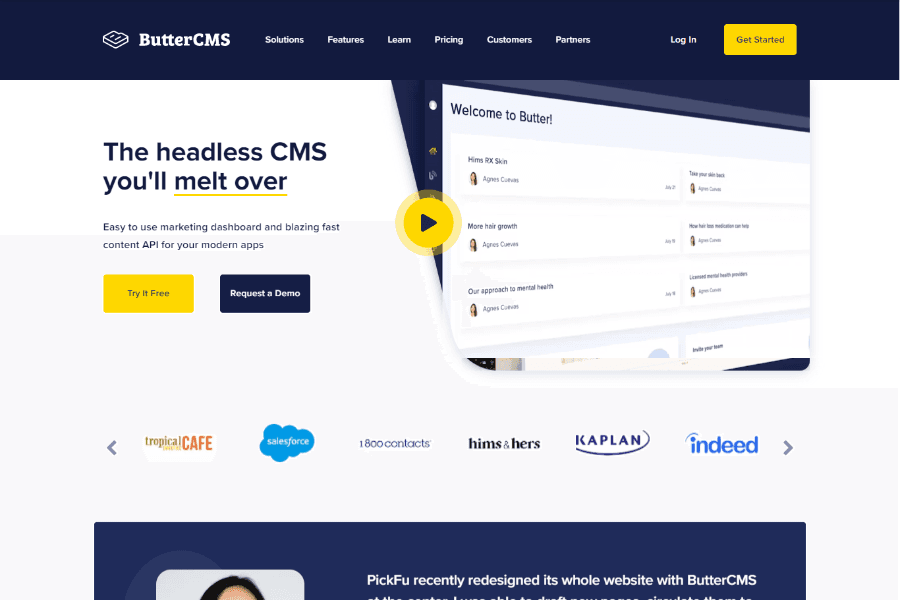
ButterCMS is not only a headless CMS but also a blog engine that you can sync quickly into any latest or ongoing website crafting project. It was built from the bottom up to offer a developer-friendly environment, built-in SEO features, previewing, revisions, and scheduling.
The structure and workflow of this CMS notably satisfy the marketers & developers. It allows you to build your sites in your preferred programming language. Moreover, it's ideal for blogging websites, dynamic web pages and more.
Advantages
- Centralized dashboard for managing contents flexibly
- You can edit and then save the images to the media library
- Get professional support to solve any issue
- Schedule your posts and show them to any channel you want
- No need to worry about maintaining the security and scaling
Disadvantages
- Some essential add-ons are missing
- Editor option does not appear on the scroll
- Complex to handle large-scale sites

Kontent
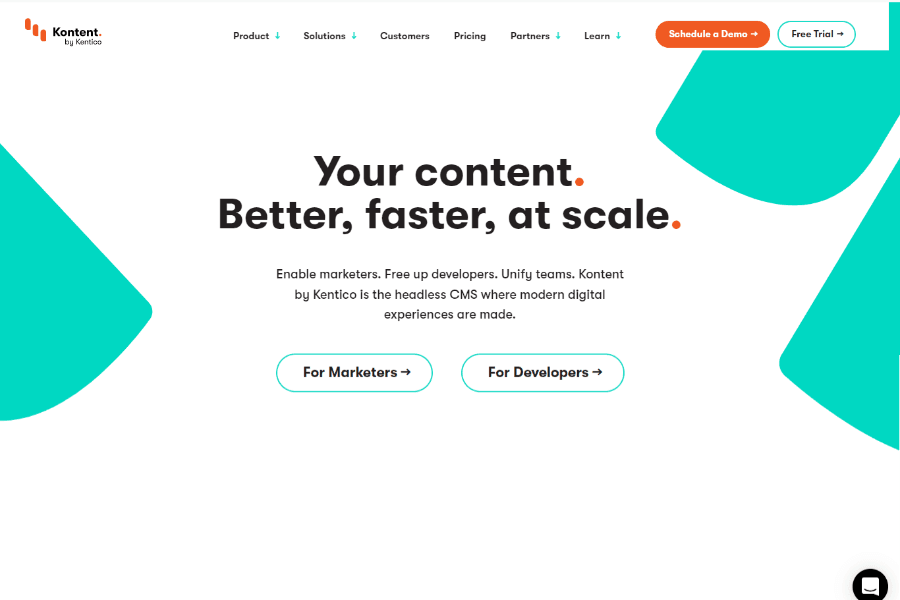
Kentico Kontent is a trending cloud-based headless CMS that provides editors and developers with a holistic digital experience. It can supply multichannel content via a single source of content. Moreover, it offers a rapid API to present content on any device with its SAAS model architecture.
This Hugo CMS aligns a scattered group with continuous editing, inline comments, and a pre-built suggestion mode. As a result, distant teams can interact effectively while maintaining a site's content. Editors have the ability to maintain the content through bespoke processes and schedule the content release and reviews.
Advantages
- You don’t need thorough technical knowledge to run this user-friendly CMS
- Create engaging content in your preferred language to reach a global audience
- Simultaneous editing experience through collaboration and content strategy designing
- Maintain multiple role-based custom work-flow and monitor the changes
- Handle all your content in one repository
- Use the built-in library to store and manage all of your digital content
Disadvantages
- The excessive number of pop-ups may confuse the users sometimes
- Pricing plans are more focused on medium and large companies
Front Matter
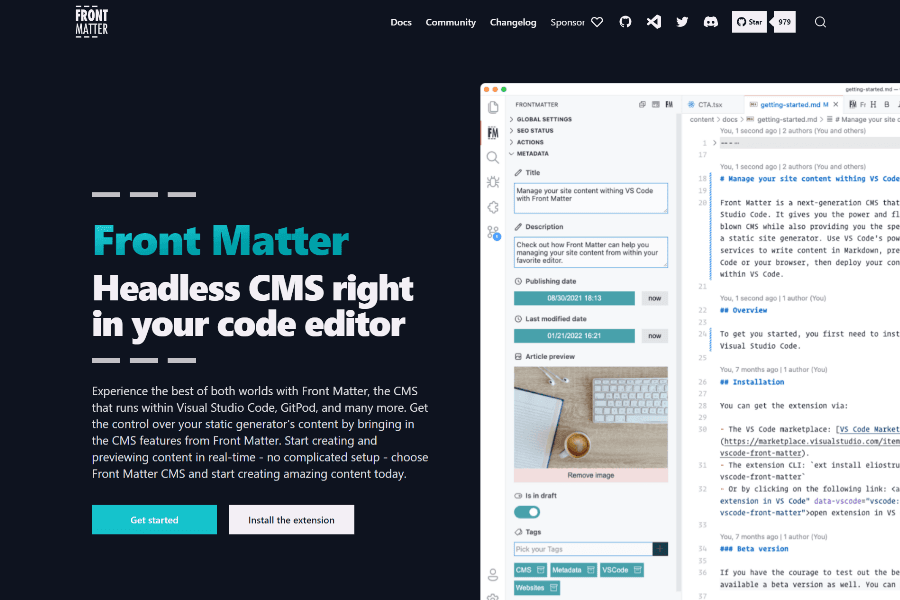
Conclusion
As we've demonstrated in this article, selecting the best CMS for Hugo is not a straightforward process. It requires you to focus on specific features that will satisfy your requirements while crafting a fantastic website. Therefore, you should look beyond the popularity of a content management system and implement them practically to sort out the best match for your company's goals.
We've made your decision-making process a lot easier by clearly indicating the benefits, drawbacks, resources, and price plans of some of the best CMSs. Hopefully, you will now be able to leverage the full potential of Jamstack technology and take advantage of the unique features while building your web project.
You might want to check out Best Hugo Themes.
Need Experts Help To Build Your Hugo Website?
We have over 5 years of experience in the Hugo industry and successfully completed 60+ client projects. Send us your requirements & let our team take care of everything else!
Hire Us
